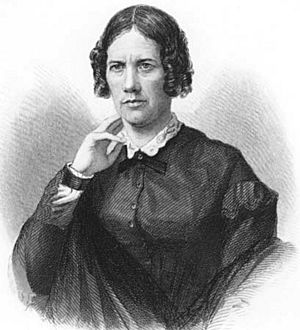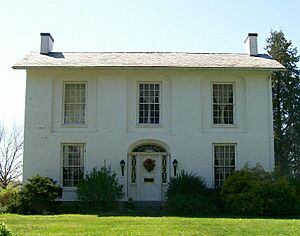Frances Dana Barker Gage facts for kids
Quick facts for kids
Frances Dana Barker Gage
|
|
|---|---|

Engraving of Frances Gage
|
|
| Born | October 12, 1808 Washington County, Ohio, U.S.
|
| Died | November 10, 1884 (aged 76) Greenwich, Connecticut, U.S.
|
| Nationality | American |
| Occupation | Writer, poet, activist, abolitionist |
| Spouse(s) | James L. Gage (1829–1863) |
| Parent(s) | Colonel Joseph Barker (1765–1843) Elizabeth Dana (1771–1835) |
Frances Dana Barker Gage (October 12, 1808 – November 10, 1884) was an important American leader. She worked to make society better for everyone. She was a strong supporter of women's rights and an abolitionist. This means she believed in equal rights for women and wanted to end slavery.
Frances Gage worked closely with other famous leaders. These included Susan B. Anthony and Elizabeth Cady Stanton. They were key figures in the early movement for women's rights in the United States. She was one of the first people to fight for voting rights for all citizens. She believed everyone should vote, no matter their race or gender. She especially supported giving voting rights to newly freed African American women. This was during the time after the Civil War, known as Reconstruction. She also supported voting rights for African American men who had been slaves.
Contents
Early Life and Education
Frances Dana Barker was born on October 12, 1808. Her family lived near Marietta, Ohio. Her parents were farmers, Elizabeth Dana and Colonel Joseph Barker. Frances was one of eleven children. Her family's house is still standing today and is a historic site.
In 1788, her family moved from New Hampshire. They crossed the Alleghenies and were among the first settlers in the United States Northwest Territory. On January 1, 1829, Frances married James L. Gage. He was a lawyer who also believed in ending slavery.
Career and Activism
Frances Gage said her work for women's voting rights began when she was ten years old. She was helping her father make barrels. Her father praised her good work. But then he said it was a shame she was a girl. Frances wrote that this moment changed her. It made her dislike the limits placed on people because of their gender. This feeling led to her later activism.
Frances Gage started her main activist work after 1848. In 1850, she organized a meeting in McConnelsville, Ohio. Seventy people attended this meeting. They worked to remove race and gender from the requirements for state citizenship and voting rights in Ohio. However, their efforts were not successful at that time.
She was active in several important movements. These included the temperance movement (which worked to reduce alcohol use), the anti-slavery movement, and the women's rights movement. In 1851, she led a women's rights meeting in Akron, Ohio. At this meeting, she introduced Sojourner Truth. Gage later wrote down her memory of Truth's famous speech, "Ain't I a Woman?." Gage's version of the speech is different from other accounts from 1851. It is longer and includes the well-known phrase "ain't I a woman." Even though her version might not be exactly what Sojourner Truth said, it has become the most famous record of that speech.
In 1853, Frances Gage moved to St. Louis, Missouri. There, she often faced threats because of her strong anti-slavery beliefs. Six months later, she was chosen to lead the National Woman's Rights Convention in Cleveland. In 1857, she traveled to Cuba and other islands. When she returned, she wrote and gave speeches. Because Missouri was a slave state, it was hard for her to express her strong views. So, she and her family moved back to Columbus, Ohio, in 1860. Her husband's health was getting worse. Also, their family had survived three mysterious fires, likely because of Frances's anti-slavery work.
In 1860, Gage became an editor for the Ohio Cultivator newspaper. She used her position to support feminists and abolitionists. She also tried to get a law passed in Ohio. This law would have given married women the same property rights as men. But she was not successful.
When the American Civil War started, she worked for the Western Sanitary Commission. She traveled along the Mississippi River to help injured people. She visited places like Vicksburg, Natchez, and Memphis. From 1863 to 1864, she was a superintendent at Parris Island, South Carolina. This was a safe place for over 500 freed slaves. While there, she became friends with nurse Clara Barton. Gage joined the American Equal Rights Association in 1863. She worked as a paid lobbyist and writer for them.
In 1865, Frances Gage was injured when her carriage overturned. But even though she was crippled, she kept giving speeches. Her speeches focused on three main causes: ending slavery, women's rights, and temperance. Other women's rights leaders encouraged her to be their representative in the American Midwest. She traveled and gave speeches in many states. In 1867, she spoke at the first anniversary of the American Equal Rights Association.
She once said:
When we hold the ballot, we shall stand just there. Men will forget to tell us that politics are degrading. They will bow low, and actually respect the women to whom they now talk platitudes; and silly flatteries, sparkling eyes, rosy cheeks, pearly teeth, ruby lips, the soft and delicate hands of refinement and beauty, will not be the burden of their song; but the strength, the power, the energy, the force, the intellect and the nerve, which the womanhood of this country will bring to bear, and which will infuse itself through all the ranks of society, must make all its men and women wiser and better.
Publications
Frances Gage wrote books and poems for children. She used the pen name "Aunt Fanny." Some of her books include Fanny at School and Fanny's Birthday. She wrote for The Ohio Cultivator and other local newspapers. She often wrote as a kind, home-loving person who gave advice to housewives in Ohio. She also wrote essays, letters, poems, and novels. She contributed to many other publications. These included the Western Literary Magazine and New York's Independent. She also published collections of her poems and novels like "Elsie Magoon" (1872) and "Steps Upward" (1873). "A Hundred Years Hence" was a hymn she wrote, first sung in 1875.
Oppression and war will be heard of no more
Nor the blood of a slave leave his print on our shore,
Conventions will then be a useless expense,
For we'll all go free suffrage, a hundred years hence.
Later Views on Religion
Frances Gage did not follow her religion, Universalism, all her life. She wrote later that Universalists did not support her work as an abolitionist or for women's rights. She felt that life was too important to focus only on religious teachings.
Personal Life
Frances married James L. Gage on New Year's Day in 1829. For 35 years, James supported Frances's dedication to helping others. They had eight children together. Four of their sons fought for the Union Army during the American Civil War. In 1862, Frances and her daughter Mary traveled to South Carolina. They went to train former slaves. In 1863, James Gage became very ill and died in Columbus, Ohio.
Frances Gage suffered a serious stroke in 1867. She died in Greenwich, Connecticut, on November 10, 1884.
See also
 In Spanish: Frances Dana Barker Gage para niños
In Spanish: Frances Dana Barker Gage para niños
 | Georgia Louise Harris Brown |
 | Julian Abele |
 | Norma Merrick Sklarek |
 | William Sidney Pittman |


